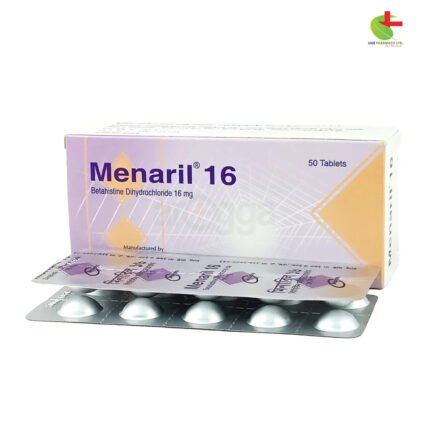Menaril 8
30.00৳ Strip
- Menaril is a histamine analogue that alleviates symptoms of Meniere’s disease, including vertigo, tinnitus, and hearing loss.
- It enhances microcirculation in the inner ear, helping to reduce pressure and restore balance.
- Primarily acts as an H1-receptor agonist while also functioning as an H3-receptor antagonist.
- Consult a healthcare professional for proper usage and dosage recommendations.
 Brand
Brand
|
Incepta Pharmaceuticals Ltd |
|---|---|
 Generics
Generics
|
Betahistine Dihydrochloride |
 Type
Type
|
Tablet |
Indications
Meniere’s disease and similar syndromes are characterized by episodes of vertigo, tinnitus, and/or gradual hearing loss, often accompanied by nausea and vomiting.
Description
Menaril is a histamine analogue developed following successful intravenous administration of histamine in patients with Meniere’s Syndrome. It alleviates vertigo symptoms by enhancing blood circulation in the inner ear’s microvasculature, which reduces pressure on the membranous labyrinth, thereby alleviating Meniere’s disease symptoms.
Pharmacology
The pharmacological action of betahistine is complex. Meniere’s disease is believed to stem from an imbalance in endolymphatic fluid levels in the ear. Primarily, betahistine functions as a histamine H1-receptor agonist. Activation of H1-receptors in the inner ear induces vasodilation, increasing blood vessel permeability and lowering endolymphatic pressure. This mechanism helps prevent labyrinth rupture, which can lead to hearing loss associated with Meniere’s disease. Additionally, betahistine is thought to minimize the asymmetrical activity of vestibular sensory organs and enhance blood flow in the vestibulocochlear region, reducing vertigo symptoms.
Moreover, betahistine acts as an H3-receptor antagonist, promoting increased turnover of histamine from postsynaptic histaminergic nerve receptors, thereby enhancing H1-agonist effects. This antagonism also raises neurotransmitter levels, including serotonin, in the brainstem, inhibiting vestibular nuclei activity, restoring balance, and diminishing vertigo symptoms.
Dosage & Administration
Adults: The initial oral dosage ranges from 8 to 16 mg taken three times daily, preferably with meals. Maintenance doses typically fall between 24-48 mg daily, not exceeding 48 mg. Dosage can be tailored to individual patient needs, and improvements may take several weeks to manifest. Data for patients with liver or kidney impairment is unavailable, and caution is recommended for elderly patients.
Children and Adolescents: Betahistine tablets are not advised for individuals under 18 due to insufficient safety and efficacy data.
Consult a registered physician before taking any medication.
Interaction
There are no documented hazardous interactions. Some reports suggest interactions with ethanol and compounds containing pyrimethamine, as well as enhanced effects when combined with salbutamol. Menaril, as a histamine analogue, may have reduced effectiveness when taken with H1 antagonists.
Contraindications
Betahistine should not be used in patients with phaeochromocytoma, as it may trigger catecholamine release, leading to severe hypertension. Hypersensitivity to the active ingredient is also a contraindication.
Side Effects
Menaril is generally well tolerated, with no known severe adverse effects. However, gastrointestinal issues, headaches, rashes, and itching may occasionally occur.
Pregnancy & Lactation
Pregnancy: The safety of Betahistine during pregnancy has not been fully established, although animal studies show no teratogenic effects. A careful risk-benefit assessment is recommended before prescribing during pregnancy.
Lactation: Betahistine is excreted in breast milk at concentrations similar to plasma. The effects on neonates at these levels are unknown.
Precautions & Warnings
Caution is advised when prescribing to patients with a history of peptic ulcers due to potential dyspepsia. Patients with bronchial asthma, urticaria, rashes, or allergic rhinitis should be monitored closely, as betahistine may exacerbate these conditions. Use with caution in patients with severe hypotension. Those with rare hereditary conditions affecting galactose metabolism should avoid this medication.
Effects on Ability to Drive and Operate Machinery: Although rare, reports of drowsiness associated with betahistine have been noted. Patients should refrain from activities requiring high concentration, such as driving or operating machinery, if affected.
Overdose Effects
Overdose symptoms may include nausea, vomiting, dyspepsia, ataxia, and seizures. Serious complications, such as convulsions or pulmonary/cardiac issues, have occurred, particularly in intentional overdoses combined with other substances. There is no specific antidote; gastric lavage and symptomatic treatment are recommended.
Therapeutic Class
Medications for Meniere’s disease.
Storage Conditions
Store below 30°C, away from light and moisture. Keep out of reach of children.













Reviews
There are no reviews yet.